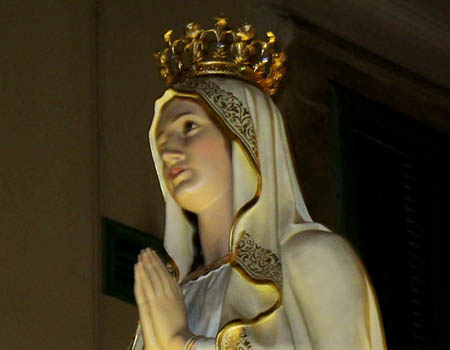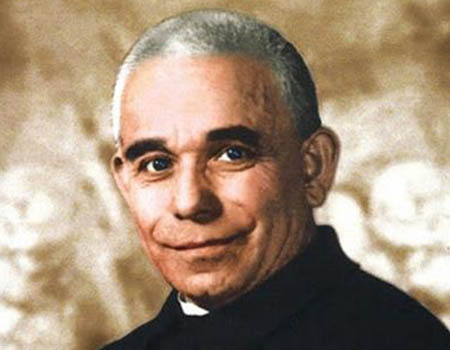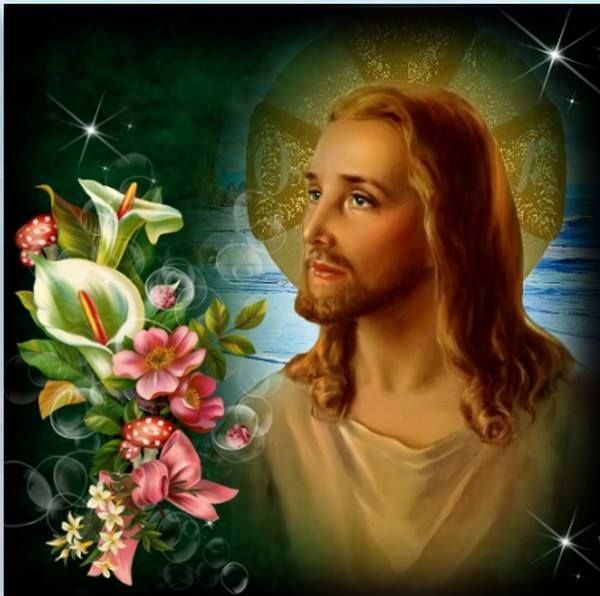
25/09/2014
Catechesi N. 41
A - È necessario risanare continuamente l'anima, rinnovarla, perché sono molte le mancanze di amore, forse peccati veniali, che le impediscono di ricevere più Grazie e la invecchiano.
B - "Prendete il mio giogo sopra di voi e imparate da me. (…) Il mio giogo infatti è dolce e il mio peso leggero".
C - Come mai molti mangiano il Corpo di Cristo e non cambiano mai comportamenti, rimanendo sempre con le stesse vecchie e cattive abitudini?
D - "La messe è abbondante, ma sono pochi gli operai!". Pochi operai della Vigna mistica si dedicano alla salvezza delle anime.
Incredibile filmato cliccare sotto per vederlo
http://www.youtube.com/watch?v=NpsVDq_K0Zo

05/07/2014
A - È necessario risanare continuamente l'anima, rinnovarla, perché sono molte le mancanze di amore, forse peccati veniali, che le impediscono di ricevere più Grazie e la invecchiano.
Il vino nuovo è il Vangelo e non può versarsi in otri vecchi, che sono i cuori corrotti. Questa è la più semplice spiegazione delle parole di Gesù.
Gli otri vecchi presentano sicuramente piccole spaccature dovute alla consumazione, con riparazioni e attenzioni particolari.
Soprattutto è la forza della fermentazione del vino nuovo a far scoppiare gli otri vecchi.
I produttori valutano con molta attenzione l'opportunità di usare otri più antichi e si fidano maggiormente di quelli più nuovi.
Gli otri vecchi rappresentano la vecchia mentalità mondana. Rimane impensabile che questa mentalità accolga la dottrina insegnata da Gesù, una dottrina opposta alla concezione della vita scelta dai peccatori.
Gesù oggi proclama la necessità di accogliere la sua dottrina con spirito nuovo, giovane, e con desideri di miglioramento.
Il vino nuovo della Grazia richiede che l'anima rinnovi continuamente alcune disposizioni, a cominciare dal desiderio del cammino di santità.
Quindi, ogni mattina nella preghiera amorosa si deve chiedere a Gesù l'aiuto per rimanere fedeli a Lui e determinati.
Il Vangelo di Gesù ci presenta un fervore che non è di questa terra.
Un fervore assente in altri maestri considerati subdolamente attendibili.
Il fervore non è solo la partecipazione emotiva a un atto religioso, è qualcosa di più intimo e spirituale.
Il fervore divino che spinge ad una vita virtuosa è presente dove Dio rimane al centro di tutto.
Possiamo capire di quale fervore parliamo riguardo alla Madonna.
Il fervore è l'ardore di un sentimento, una dedizione piena alla religiosità o ad un'attività. Il fervore è diverso dalla partecipazione personale.
Nella Madonna si tratta di una grande intensità di sentimento e di azione, per i suoi interventi nel mondo.
Non si può scopiazzare l'amore che la Madonna porta nel suo Cuore, riversandolo direttamente nelle anime che La invocano con grande devozione e, tramite questi umili e profondi messaggi, nelle varie apparizioni riconosciute.
L'invito all'umiltà è basilare per costruirci sopra un fondamento spirituale con la presenza di tutte le altre virtù.
Lo Spirito Santo porta continuamente nell'anima un vino nuovo, la Grazia santificante, che deve crescere sempre di più.
È necessario risanare continuamente l'anima, rinnovarla, perché sono molte le mancanze di amore, forse peccati veniali, che le impediscono di ricevere più Grazie e la invecchiano.
Buona preghiera a tutti.

06/07/2014
B - "Prendete il mio giogo sopra di voi e imparate da me. (…) Il mio giogo infatti è dolce e il mio peso leggero".
Prima di queste parole, Gesù rivolse invettive pesanti contro le città idolatriche che Lo avevano rifiutato.
Erano Corazin, Betsaida, Tiro e Sidone, colpite dai rimproveri del Signore e considerate impenitenti nonostante la sua presenza e una profonda predicazione.
Da queste invettive che riguardano i versetti 11-24 del capitolo 11 di Matteo, si passa alla lode umile e amorosa che Gesù esprime al Padre. Non c'è certezza sulla consequenzialità delle parole.
Lo Spirito Santo ha ispirato questa sequenza con le parole di oggi, dal versetto 25 in poi, che sono ardenti e appassionate, rivolte al Padre per ringraziarlo dei "piccoli" che aveva trovato nella sua missione.
Troviamo nel Vangelo l'unione di una desolante osservazione di Gesù dinanzi alle città corrotte. Da un'umanità che Lo rifiutava e disprezzava, e che si dirigeva inesorabilmente verso la perdizione, alla consolante realtà di tutto un popolo di "piccoli", "affaticati e oppressi".
Oltre all'esaltazione del Padre, Gesù si rivolge all'umanità e mostra l'infinità bontà del suo Cuore, la sua disponibilità ad aiutare tutti, nessuno escluso.
I versetti dal 25 al 30 li divido in due sezioni, come due sono le direzioni della lode e del richiamo:
1) Ti rendo lode, Padre, Signore del Cielo e della terra, perché hai nascosto queste cose ai sapienti e ai dotti e le hai rivelate ai piccoli.
2) Venite a me, voi tutti che siete stanchi e oppressi, e Io vi darò ristoro.
La prima parte è una lode rivolta al Padre. Non era comunque la prima volta che il Figlio manifestava tutto il suo Amore a Colui che Lo aveva inviato in mezzo a noi.
Gesù godeva ininterrottamente della visione beatifica e fruiva del gaudio del Paradiso perché vedeva Dio direttamente. Non c'era e non poteva esserci un solo istante di non comunione con il Padre.
In questo ringraziamento al Padre coinvolge i "piccoli", esprimendo la sua gioia per le rivelazioni di Dio agli umili e ai buoni.
A questa lode Gesù aggancia l'invito rivolto all'umanità di ricorrere a Lui per trovare ristoro, la pace, la forza per proseguire nella verità e non più nella corruzione.
"Venite a me (…) Io vi darò ristoro".
Questa seconda parte è quella che dobbiamo esaminare meglio, perché solo attuando la seconda parte si può godere delle rivelazioni enunciate da Gesù nella prima.
"Hai nascosto queste cose ai sapienti e ai dotti e le hai rivelate ai piccoli".
Solo i buoni e i veri seguaci del Vangelo ricevono la Luce dello Spirito Santo e con i suoi doni vivono una straordinaria spiritualità. Quindi, dobbiamo diventare "piccoli".
Questa chiamata alla piccolezza è rivolta indistintamente a tutti. Inoltre più si ricoprono incarichi ecclesiali prestigiosi, maggiormente deve evidenziarsi la piccolezza del Vangelo.
I segni dei "piccoli" come l'intende il Signore, sono l'umiltà, la mitezza, la bontà, la verità, la giustizia, la gioia, la pazienza, la fedeltà piena alla Parola di Dio.
Queste caratteristiche si riscontrano nei "piccoli", quindi per riconoscere i "piccoli" del Vangelo bisogna vedere queste virtù.
Il dono massimo, insuperabile, la grandezza dell'amore di Gesù per alcune creature umane è la sua volontà di rivelare ad esse il Padre.
Sono coloro che rispondono senza condizione alla volontà di Dio. E Gesù li farà suoi e li trasfigurerà, diventeranno membra del suo Corpo, e parte di sé.
Gli "affaticati e oppressi" devono vedere in Lui il modello di mitezza e di umiltà di Cuore.
Veniamo adesso alla frase che non trova spiegazioni in molti casi.
"Prendete il mio giogo sopra di voi e imparate da me. (…) Il mio giogo infatti è dolce e il mio peso leggero".
Il giogo è un dispositivo, concepito fin dall'antichità per la trazione animale, che, applicato alla parte anteriore del corpo di uno o più animali da tiro, ne permette la sottomissione.
Si tratta di un attrezzo in legno, con accessori in metallo e in cuoio, in forma di barra trasversale sagomata applicato al collo degli animali.
Il giogo di Gesù che dobbiamo prendere è il suo Vangelo. Egli non ci vuole dare pesi insopportabili da portare o da trainare a causa della stanchezza.
Il Signore è venuto per darci ristoro, sollevarci dall'affanno e dall'oppressione delle sofferenze e di una società senza Dio.
Non viene a dirci di sovraccaricarci. Invita prima ad abbandonare i pesi insostenibili dei vizi e dei peccati. Sono questi pesi brutali a deformare l'anima e a trasformare il volto di rabbia, odio, sregolatezza.
È impossibile prendere su di noi il dolce carico del Vangelo di Gesù senza l'abbandono della vita corrotta.
Solo dopo questa decisione il Signore ci dona una forza soprannaturale superiore alle sofferenze e trasforma il dolore in gioia.
Gesù ha preso su di sé i nostri peccati, e tutto il male di uomini e donne di tutti i tempi. L'esempio del Signore è unico.
Ma noi che Lo seguiamo, siamo in grado di alleggerire gli altri dei loro pesi?
Gesù è venuto a liberare gli uomini dai pesi più gravosi, prendendoli su di sé.
Se vogliamo imitare Gesù senza sovraccaricarci di altri pesi, quantomeno possiamo evitare di scaricare preoccupazioni inutili sugli altri, aiutandoli invece a portare quelle che hanno.
Se è possibile, li sosterremo nei loro impegni, nei doveri che la vita comporta, nella stima da manifestare, portando sollievo e serenità, consapevoli però di non fare mai abbastanza.
Con la nostra vicinanza a chi soffre, alleggeriamo i loro pesi soprattutto per mezzo della preghiera che si recita con fervore ogni giorno.
Dobbiamo alleggerire gli altri, sempre nella verità, e senza dire menzogne e difese false. Non si aiuta così chi sbaglia. Lo si copre solo stupidamente.
Gesù sceglie nei vari periodi della storia tanti Santi come San Pio e San Giovanni Paolo, che prendono letteralmente i pesi degli altri e li espiano con una vita eroica, con rinunce incredibili, continue preghiere anche notturne, reiterati rinnegamenti, penitenze e digiuni per ottenere miracoli dal Cuore di Gesù per intercessione della Vergine Maria.
Se incontrate nella vita qualcuno che prega e si sacrifica per voi, ringraziate la Madonna e pregate sempre per chi vive per voi. Buona preghiera a tutti.
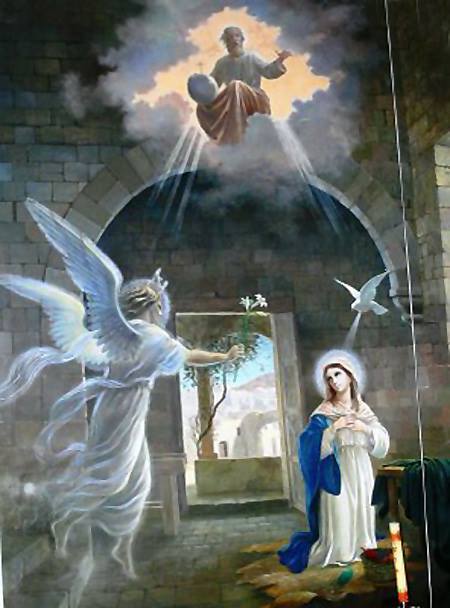
07/07/2014
C - Come mai molti mangiano il Corpo di Cristo e non cambiano mai comportamenti, rimanendo sempre con le stesse vecchie e cattive abitudini?
Quella donna sperava di toccare almeno il lembo del mantello di Gesù per ricevere il miracolo tanto atteso e lo ha ottenuto.
I cristiani invece mangiano il Corpo di Cristo e molto spesso non ottengono nulla. La differenza è sostanziale tra il toccare e il mangiare, cioè fare entrare nel proprio corpo la Divina Ostia.
È una questione di Fede. Una Fede che non si improvvisa e che si sviluppa con pazienza giorno dopo giorno, con una vita sacramentale corretta, la pratica coerente delle virtù, la preghiera umile e fiduciosa.
La vera Fede non si trova in quelli che si esaltano e impongono la loro santità con parole inventate e una spiritualità inesistente!
La Fede della donna del Vangelo era frutto innanzitutto della sua coscienza pura. Dio le poteva dare il suo Amore e ricolmarla di conoscenze soprannaturali.
Infatti la donna non era una discepola di Gesù, né ci sono indicazioni di incontri in altri contesti.
Chissà da quanto tempo la donna pregava Gesù nel suo cuore, in silenzio, senza clamori e con una umiltà profonda unita alle virtù.
Questo è il vero cammino di santità. La salita per arrivare ad incontrare Gesù senza rimanere nell'illusione e nell'esaltazione.
Senza spogliarsi dei vizi e di quei comportamenti opposti al Vangelo si rimane sempre immaturi nella Fede e non ci sono parole sufficienti per diventare credibili e sinceri.
Già il nostro volto manifesta la gioia o la guerra interiore, la verità o l'inganno, la spiritualità umile o l'ostentazione del vuoto.
Non sono le parole a dare contenuto alla nostra Fede. La Fede deve imporsi da sola anche se restiamo in silenzio.
La donna non ha detto nulla a Gesù, non ha cercato di ingannarlo con parole falsamente spirituali e non manifestava agli altri la sua Fede. Insomma non cercava lodi da nessuno e serbava nel suo cuore la vita contemplativa. Proprio come la Madonna.
Toccò solamente il lembo del mantello, ma quel tocco della mano trasportava una Fede irriducibile che commosse il Signore.
"Diceva infatti tra sé…". Vedete come la donna coltivava nel proprio cuore una Fede profonda? Non la ostentava per vantarsi, non cercava gli applausi dei conoscenti, voleva solamente entrare in contatto con Gesù.
Cosa dovrebbe succedere allora ai credenti che mangiano il Corpo di Cristo?
"Se riuscirò anche solo a toccare il suo mantello, sarò salvata".
Non vale molto di più mangiare la Carne di Dio incarnato?
Allora il problema si sposta sulla Fede verso l'Eucaristia. Come mai molti mangiano il Corpo di Cristo e non cambiano mai comportamenti, rimanendo sempre con le stesse vecchie e cattive abitudini?
Bisogna andare indietro, ancora prima della Messa. Ognuno deve verificare la sua condotta, e con quali disposizioni interiori si presenta all'altare.
Sono stati confessati i peccati mortali? Si è donato il perdono agli altri? Si osservano i Comandamenti?
Gesù attende prima nel confessionale per mettere in ordine l'anima!
Quando l'ordine è presente nel credente, avviene sempre qualcosa di grande ricevendo il Corpo di Cristo. Si riceve l'Essere perfetto che rilascia qualche Grazia per farci crescere nella Fede.
Gesù Eucaristia dona sempre qualcosa in più a tutti i credenti ben disposti interiormente, e ripete anche nel confessionale e quando ci si reca davanti al Tabernacolo: "Coraggio, la tua Fede ti ha salvato".
Buona preghiera a tutti.
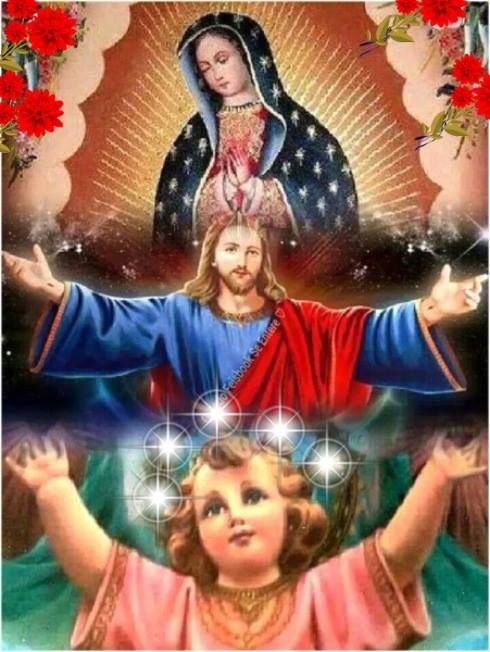
08/07/2014
D - "La messe è abbondante, ma sono pochi gli operai!". Pochi operai della Vigna mistica si dedicano alla salvezza delle anime.
"La messe è abbondante, ma sono pochi gli operai!". La messe qui ha il significato di ciò che si raccoglie come frutto di un'attività.
La messe è l’operazione di falciare e raccogliere i cereali, e in particolare il grano, quando le spighe sono giunte a maturazione.
Messe in questo caso è sinonimo di mietitura. Il ricavato della messe o mietitura, cioè il raccolto, soprattutto con riguardo alla quantità, può essere abbondante o scarso.
Gesù ci avvisa che il raccolto nel campo del mondo è abbondantissimo. C'è molto buon grano da raccogliere ma bisogna trovarlo in mezzo alla zizzania altissima e a moltissime erbacce velenose.
Il buon grano, cioè le anime buone che ancora non conoscono Gesù o non hanno la forza di cambiare vita, sono in attesa, lì dove vivono, di qualcuno che raccolga i loro desideri inconsci di incontrare Dio e di vivere secondo i Comandamenti.
Innumerevoli persone sono come il buon grano e attendono un invito alla preghiera, una spiegazione della Parola di Dio, un sostegno morale per decidersi a cambiare vita.
Molti cristiani hanno accanto peccatori e non rivolgono ad essi inviti alla conversione e a fare una santa Confessione. Tra i familiari, i colleghi, gli amici e i conoscenti, molti sono lontani dal Vangelo e nessuno raccoglie la loro angoscia per trasformarla in gioia autentica.
"La messe è abbondante, ma sono pochi gli operai!". Pochi operai della Vigna mistica si dedicano alla salvezza delle anime.
In questi giorni abbiamo seguito la vicenda della processione che si è svolta a Oppido Mamertina in Calabria. Il clamore suscitato è scaturito dalla fermata con l'inchino della vara con la statua della Madonna dinanzi alla casa di un boss.
Vara è un termine utilizzato in Sicilia e in alcune Regioni dell'Italia del Sud per indicare il carro trionfale su cui vengono posti statue o dipinti di Santi per essere portati in processione.
Questo gesto è da condannare certamente. Ma non si capisce perché lo si condanna oggi e non tutte le volte che lo si commetteva negli anni passati.
La paura di numerosi parroci fa privilegiare il silenzio anche dinanzi a queste scene vergognose, e si è potuto compiere l'inchino anche quest'anno per un tacito assenso.
L'omelia che non forma durante tutto l'anno i fedeli ad una spiritualità autentica ed anche la mancanza di buoni esempi, favoriscono queste trasgressioni.
Non è stata la Madonna ad inchinarsi davanti alla casa del boss. Ella vuole convertire anche i boss ma non può inchinarsi dove non c'è alcun desiderio del Vangelo e di una vita onesta.
Gli uomini hanno inchinato la vara e la statua, anche se raffigurava la Madonna.
Questo però non deve comportare uno scandalo per i fedeli. Come conseguenza il presidente dei vescovi calabresi ha chiesto di annullare tutte le processioni.
Il discorso cambia quindi direzione, e vediamo che i teologi modernisti aborriscono le processioni, come sono contrari all'adorazione dell'Eucaristia, alla recita del Rosario e alla devozione alla Madonna.
Sto parlando di teologi cattolici. Ad essi si devono aggiungere, e non in seconda fila, quei vescovi lontani dalla sana dottrina che hanno tra i loro obiettivi l'annullamento della devozione alla Madonna, cominciando proprio con il blocco delle processioni.
Discorso diverso e molto coraggioso è quello dell'Arcivescovo di Monreale (Palermo). In questi mesi diverse volte ha parlato di allontanamento dei mafiosi dalle Confraternite. Ha indicato ai suoi parroci di non fare intervenire quanti hanno in qualche modo collusione con la criminalità. Ma le processioni vuole farle, non vuole danneggiare migliaia di devoti credenti per colpa di un uomo solo.
Gesù oggi ci parla di messe da raccogliere e non di disperdere il buon grano annullando le processioni. La volontà di annullarle non lascerebbe contenta la Madonna, come invece ha affermato sempre il presidente dei vescovi calabresi.
Innanzitutto valutiamo che la Madonna vorrebbe salvare anche quei criminali, poi non si possono privare migliaia di credenti di un momento così toccante e ricco di devozione.
Molti fedeli nelle processioni fanno voti particolari, penitenze come andare a piedi nudi, promesse e intense preghiere.
Non si pensa più a questo ma solo a giustiziare i cattivi? La misericordia è scomparsa e si pronuncia solo per abbellire i discorsi.
Gesù è venuto a curare i malati. Non possiamo stravolgere il Vangelo per imporre un orgoglio umano e pericoloso.
Nel Vangelo si parla di un muto indemoniato. L'uomo non parlava perché posseduto dai diavoli.
Anche questo caso mostra che satana può causare malattie e sofferenze strane.
Ciò comunque avviene alle persone che non pregano o pregano senza partecipazione.
"Dopo che il demonio fu scacciato, quel muto cominciò a parlare".
Anche questa guarigione scaturisce dall'allontanamento dei diavoli dal corpo dell'uomo. La liberazione ha riportato la parola.
Questo esorcismo è evidentissimo. E intanto teologi e molti vescovi negano gli esorcismi di Gesù, negano i diavoli e l'inferno.
Vedo ogni giorno i miglioramenti spirituali di molti fedeli che vengono in Associazione o che mi contattano.
Le indicazioni che do contro i diavoli sono mirate a far perdere ad essi il potere di continuare a danneggiare le persone e tremano quando cominciamo a pregare in Associazione pur trovandoci distanti.
Invocate molte volte il Nome di Gesù, Lui guarisce ogni malattia, ogni infermità e libera da ogni spirito del male
Buona preghiera a tutti.
Santa Benedetta Cambiago
English Edition
Catechesis # 41
A - You need to constantly heal the soul, renew it, because many are the deficiencies of love, perhaps venial sins, which prevent it from receiving Graces and make it look old.
B - "Take my yoke upon you and learn from me. (...) For my yoke is sweet and my burden light."
C - Why on earth many eat the Body of Christ and never change behaviors, while remaining with the same old and bad habits?
D - "The harvest is plentiful, but the laborers are few." Few workers of the Vineyard mysticism dedicate themselves to the salvation of souls.
07/05/2014
A - The new wine is the Gospel and can not be spilled into old wineskins, which are the corrupt hearts. This is the simplest explanation of the words of Jesus.
The old wineskins present definitely small cracks due to consumption, with repairs and particular attentions.
Above all it is the strength of the fermentation of the new wine to burst the old wineskins.
The producers evaluate very carefully the opportunity to use older wineskins, more trusting to rely on the new ones.
The old wineskins represent the old worldly mentality. It remains unthinkable that this mentality welcomes the doctrine taught by Jesus, a doctrine opposed to the concept of the life chosen by sinners.
Today Jesus proclaims the necessity of accommodating his doctrine with a new spirit, young, and with wishes of improvement.
The new wine of Grace requires that the soul continually renews some dispositions, starting from the desire of the path of holiness.
So, every morning in the amorous prayer you must ask Jesus for the help to remain faithful to Him and determined.
The Gospel of Jesus presents us a fervor that is not of this earth.
A fervor missing in other masters underhandedly considered reliable.
The fervor it is not only the emotional participation in a religious act, is something more intimate and spiritual.
The divine fervor that pushes to a virtuous life is present where God remains at the center of everything.
We can understand of which fervor we are talking about with regard to Madonna.
The fervor is the ardor of a feeling, a full devotion at the religiousness or at an activity. The fervor is different from the personal participation.
In the Virgin Mary it is only a question of great intensity of feeling and action, for her interventions in the world.
It cannot be badly copied the love that Mary carries in her Heart, pouring it directly into the souls who invoke Her with great devotion and, by the means of these humble and profound messages, in the various apparitions recognized.
The invitation to humility is basic to build on it a spiritual foundation with the presence of all the other virtues.
The Holy Spirit continually brings into the soul a new wine, sanctifying Grace, which must grow more and more.
You need to constantly heal the soul, renew it, because many are the lacks of love, perhaps venial sins, which prevent her from receiving more Graces and older.
Good prayer at all.
Edith Stein
07/06/2014
B - B - Before of these words, Jesus addressed heavy invectives against the idolatrous cities that had refused Him.
They were Chorazin, Bethsaida, Tyre and Sidon, affected by the scolding of the Lord, and considered unrepentant despite his presence and a deep preaching.
From these invectives concerning the verses 11-24 of chapter 11 of Matthew, we proceed to the humble and loving praise that Jesus expresses to the Father. There is no certainty about the consequentiality of words.
The Holy Spirit has inspired this sequence with the words of today, from verse 25 onwards, which are ardent and passionate, addressed to the Father to thank him for the "little ones" who had found his mission.
We find in the Gospel the union of a bleak observation of Jesus in front of the corrupt cities. From a humanity that rejected and despised Him, and that inexorably moved itself toward destruction, to the comforting reality of a whole people of "little ones", "weary and burdened".
In addition to the exaltation of the Father, Jesus speaks to humanity and shows the infinite goodness of his Heart, his willingness to help everyone, without exception.
I divide the verses 25-30 into two sections, as two are the directions of the praise and of the recall:
1) I praise you, Father, Lord of Heaven and earth, because thou hast hid these things from the wise and learned and revealed them to little ones.
2) Come to me, all you who are weary and burdened, and I will give you relief.
The first part is a praise to the Father. However it was not the first time that the Son manifested all his Love to He who had sent Him among us.
Jesus continuously enjoyed of the beatific vision and availed Himself of joy of Heaven because He saw God directly. There was not and there could not be a moment of not fellowship with the Father.
In this thanksgiving to the Father He involves the "little ones", expressing his joy for the revelations of God to the humble and good people.
At this praise Jesus hooks the invitation to humanity to appeal to Him to have rest, peace and the strength to continue in the truth and no more in corruption.
"Come to me (...) I will give you rest."
This second part is the one that we need to examine better, because only by implementing the second part you can enjoy of the revelations enounced by Jesus in the first.
"You have hidden these things from the wise and the learned you have revealed them to "little ones."
Only the good people and the true followers of the Gospel receive the Light of the Holy Spirit and, with his gifts, live an extraordinary spirituality. Hence we must become "little ones".
This call to the littleness is equally addressed to all. In addition, the more you hold prestigious ecclesial duties, the more you should highlight the littleness of the Gospel.
The signs of the "little ones" as the Lord means , are the humility, gentleness, goodness, truth, justice, joy, patience, faithfulness to the Word of God.
These features are found in the "little ones", therefore in order to recognize the "little ones" of the Gospel we need to see these virtues.
The greatest gift, unsurpassed, the greatness of the love of Jesus for some human creatures is his willingness to reveal to them the Father.
They are those who respond unconditionally to the will of God. And Jesus will make them his own and will transfigure them, they will become limbs of His Body, and a part of himself.
Those "weary and burdened" must see in Him the model of meekness and humility of Heart.
We come now to the sentence that has no explanation in many cases.
"Take my yoke upon you and learn from me. (...) For my yoke is sweet and my burden light."
The yoke is a device conceived since antiquity for animal traction, which when applied to the front of the body of one or more draft animals, allows their subjection.
It is a wooden tool, with accessories in metal and leather, in the form of cross-bar shaped applied to the neck of the animals.
The yoke of Jesus that we must take is his Gospel. He does not want to give us unbearable burdens to be carried or be towed because of fatigue.
The Lord came to give us rest, and to relieve us from pain and oppression of the sufferings of a society without God.
He does not come to tell us to overburden ourselves. He first invites to abandon the unsustainable weight of vices and sins. These are the brutal weights which deform the soul and transform the face of anger, hatred, debauchery.
It is impossible to take upon us the sweet load of the Gospel of Jesus without abandoning the corrupt life.
Only after this decision the Lord gives us a supernatural force greater than the sufferings and transforms pain into joy.
Jesus took upon himself our sins, and all the evil of men and women of all times. The example of the Lord is unique.
But we which follow Him, are we able to relieve others of their weights?
Jesus came to free the men from the heaviest weights, taking them upon himself.
If we are to imitate Jesus without overburden ourselves of other weights, at least we can avoid downloading unnecessary worries about others, and instead helping them to carry the ones they have.
If possible we will support them in their commitments, in the obligations that life entails, in the estimation to manifest, bringing relief and peace of mind, however knowing that we never do enough.
With our closeness to those who suffer, we lighten their burdens especially through prayer that is recited with fervor every day.
We need to lighten the others, always in the truth, and without telling lies and false defenses. You do not help this way those who make mistakes. You cover him only stupidly.
Jesus chose in the various periods of history many saints such as St. Pio and St. John Paul, who literally take the burdens of the others, and expiate them with a heroic life, with incredible sacrifices, constant prayers, even at night, repeated denials, penances and fasts to get miracles from the Heart of Jesus through the intercession of the Virgin Mary.
If in the life you meet someone who pray and sacrifice for you, you should thank the Madonna and pray always for those who live for you. Good prayer at all.
Luisa Piccarreta
07/07/2014
C - That woman was hoping to at least touch the hem of Jesus' cloak to receive the long-awaited miracle, and she got it.
Instead Christians eat the Body of Christ, and very often they do not get anything. The difference is substantial between touching and eating, that is to say do enter into own body the Divine Host.
It is a matter of Faith. A Faith that cannot be improvised and that develops itself with patience, day after day, with a proper sacramental life, the consistent practice of the virtues, the humble and trustful prayer.
True Faith is not found in those who exalt themselves and impose their holiness with invented words and a spirituality that does not exist!
The Faith of the woman of the Gospel was primarily the result of his pure consciousness. God could give her his Love, and fill her with supernatural knowledge.
In fact, the woman was not a disciple of Jesus, nor are there indications of meetings in other contexts.
Who knows how long the woman begged Jesus in his heart, silently, without fanfare and with a profound humility combined with virtue.
This is the true path to holiness. The walk back up to meet Jesus without being in illusion and in the exaltation.
Without strip ourselves of the vices and of those behaviors opposite to the Gospel we always remain immature in the Faith, and there are no enough words to become credible and sincere.
Already our face expresses joy or inner war, truth or deception, spirituality humble or the ostentation of the vacuum.
Are not the words to give substance to our Faith. Faith must prevail alone, even if we remain silent.
The woman did not say anything to Jesus, she did not try to deceive him with words falsely spiritual and not expressed to others his Faith. In conclusion she did not search for praise by anyone and she kept in her heart the contemplative life. Just like Madonna.
She only touched the hem of his garment, but that touch of the hand was carrying an irreducible Faith that touched the Lord.
"For she said to herself ...". See how she grew in her heart a deep faith? She did not flaunt it in order to brag, she was not looking for the applauses of friends, she just wanted to get in touch with Jesus.
Then what should happen to the believers who eat the Body of Christ?
"If I only will succeed to touch his cloak, I shall be saved."
Not worth much more than eating the Meat of God incarnate?
Then the problem moves on the faith towards the Eucharist. How ever many eat the Body of Christ and never change behavior, ever remaining with the same old bad habits?
You have to go back, even before the Mass. Everyone should check his conduct, and with which interior dispositions presents himself to the altar.
Were confessed mortal sins? It was donated forgiveness to others? You keep the Commandments?
Jesus waits first in the confessional to put in order the soul!
When the order is present in the believer, it always happens something great receiving the Body of Christ. You receive the perfect Being that releases some Grace to help us grow in the Faith.
Jesus in the Eucharist gives something extra to all believers well-disposed inwardly, and also repeats in the confessional, and when you go to the Tabernacle: "Courage, your Faith has saved you."
Good prayer at all.
07/08/2014
D - "The harvest is plentiful, but the laborers are few." The harvest indeed here has the meaning of what is collected as a result of an activity.
The harvest indeed is the process of mowing and collecting the grains, and in particular the wheat, when the ears of corn are come to maturation.
The harvest indeed in this case stands for reaping. The proceeds of the harvest or reaping, that is to say the crop, especially with regard to the quantity, it may be abundant or scarce.
Jesus warns us that the harvest is very abundant in the field of the world. There is much good wheat to harvest but you need to find it in the middle of the very high darnel and a lot of poisonous weeds.
The good wheat, that is, the good souls who yet do not know Jesus or do not have the strength to change their lives, they are waiting, there where they live, for someone who collects their unconscious desires to meet with God and to live according to the Commandments.
Countless people are like the good wheat and await a call to prayer, an explanation of the Word of God, a moral support to decide to change their lives.
Many Christians have sinners next to them and do not address to them invitations to conversion and to make a Holy Confession. Among the family members, colleagues, friends and acquaintances, many are far from the Gospel and no one picks up their anguish to turn it into authentic joy.
"The harvest is plentiful, but the laborers are few." Few workers in the Vineyard mysticism are dedicated to the salvation of souls.
In these days we followed the story of the procession that took place in Oppido Mamertina in Calabria. The outcry aroused has originated from the stoppage with the obeisance of the "vara" with the statue of Our Lady in front of the home of a boss.
Vara is a term used in Sicily and in some regions of Southern Italy to indicate the triumphal chariot on which are placed statues or paintings of Saints to be brought in procession.
This gesture is certainly to be condemned. But you do not understand because this is condemned today and not all the times that it was committed in the past years.
The fear of many parsons leads to the silence even in front of these shameful scenes, and it was possible to make the obeisance also this year with tacit consent.
The homily that throughout the year does not form the faithful to an authentic spirituality, and also the lack of good examples, favor these transgressions.
It has not been the Madonna to bow down before the house of the boss. She also wants to convert the boss but cannot bow down where there is no any desire of the Gospel and of an honest life.
The men bowed the bier and the statue, although depicting the Madonna.
However, this must not imply a scandal to the faithful. As a consequence, the president of the Calabrian bishops asked to cancel all the processions.
Thus the situation changes direction, and we see that the modernist theologians abhor the processions, as at the same time they are contrary to the adoration of the Eucharist, to the recitation of the Rosary and the devotion to Our Lady.
I'm talking about Catholic theologians. To these must be added, and not in the second row, those bishops, far away from sound doctrine, that have among their objectives the cancellation of the devotion to Our Lady, just starting with the block of the processions.
A different and very courageous talk is that of the Archbishop of Monreale (Palermo). In recent months several times he talked about the expulsion of the mafia from the Brotherhoods. He pointed to his priests to refuse those who have somehow collusion with criminals. But he wants to do the processions, he does not want to damage thousands of devout believers because of one man.
Jesus speaks to us today about crops to collect and not to disperse the good wheat canceling the processions. The desire to cancel would not let Mary happy, as it has always said the president of the bishops of Calabria.
First of all, we estimate that the Madonna would like to save even those criminals, then you cannot deprive thousands of believers of a moment so poignant and full of devotion.
Many of the faithful in the processions make special vows, penances like going barefoot, promises and intense prayers.
Do not you think any more to this but only to execute the bad guys? Mercy has disappeared and you pronounce only to beautify the speeches.
Jesus came to heal the sick. We cannot distort the Gospel to impose a human and dangerous pride.
In the Gospel we talk about a dumb demoniac. The man did not speak because possessed by devils.
Also this case shows that Satan can cause sicknesses and strange sufferings.
However, this happens to people who do not pray or pray without participation.
"After the demon was cast out, the dumb man spoke."
Even this healing flows with the dismissal of the devils from the body of man. The liberation has brought back the word.
This exorcism is very evident. Meanwhile, many bishops and theologians deny the exorcisms of Jesus, deny the devils and hell.
I see every day the spiritual improvement of many of the faithful who come to the Association or who contact me.
The indications that I give against the devils are targeted to make them losing the power to continue to harm people and they tremble when we begin to pray in association, whilst being distant.
You have to invoke many times the name of Jesus, He heals every sickness, every disease, and free from every evil spirit
Good prayer at all.


